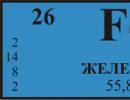New in the exam Russian language. Russian language. "Speaking" and how it will take place
All-Russian examination in the Russian language is mandatory for all graduates of the eleventh grade. At first glance, this subject should not cause any particular difficulties, especially if we compare the Russian language with the same one - a subject that requires long and thorough preparation, as well as the study of the tasks presented in the program from 5 to 11 grades.
Many students believe that you don’t have to prepare for Russian, because it is the native language for most residents Russian Federation. We communicate on it every day, watch movies, chat with friends on social networks ... However, the Russian language exam is not so simple - passing it requires some effort, especially if you apply for a mark higher than “satisfactory”. In addition, this is characterized by a high threshold score, which won't be easy to get.
Separately, we mention the annual changes in the structure of the ticket. What are the rumors about the introduction to the speaking exam! Such an innovation can significantly reduce the quality and success of passing this exam, because it is no secret that beautiful and competent speech is not often heard in schools today. Well, let's figure out whether it is worth waiting for the next innovations from specialists from FIPI, and also find out the features of the USE-2018 in the Russian language.
The introduction of the speaking part will make it much more difficult for schoolchildren to pass the exam!
Demo version of the USE-2018
USE dates in Russian
Final dates conducting the exam will be known only in January. But already today, specialists from Rosobrnadzor are ready to announce the approximate periods of time during which testing will take place:
- the early stage of the exam will be held from mid-March to mid-April 2018 (starting date - 03/22/2018);
- the main stage of the exam will begin at the end of May and will last until the beginning of June 2018. Roughly Rosobrnadzor calls the start date 05/28/2018;
- an additional period (passing the exam by students who received unsatisfactory grades or missed the main exam due to illness and other valid reasons, documented) is scheduled for the first half of September 2018. So far, the starting date is 09/04/2018.
Recall that you can write an application for passing the exam early:
- schoolchildren who received secondary education before the 2017/2018 academic year;
- students who graduated from school with a certificate instead of a certificate;
- graduates of evening schools;
- individuals who go to study outside of Russia;
- graduates of the current year who completed the curriculum ahead of schedule;
- children leaving for sports, competitions, olympiads and other events of national or international importance;
- students who need treatment or rehabilitation on the dates of the main exam.
Statistics for passing the exam in the Russian language
The opinion of students that with good preparation for the Unified State Examination, it is quite easy to pass the Russian language, is also confirmed by official statistical calculations. So, in 2017, 617 thousand schoolchildren took part in the examination, of which only 1.6% could not overcome the minimum threshold (i.e. score 36 passing points required for).
In 2016, there were 2.5% of such students. In its turn, minimum scores, required to obtain a matriculation certificate, did not gain only 0.5% of the examinees, i.e. half as much as in 2016. According to Sergei Kravtsov, head of the Rosobrnadzor, this trend testifies to the effectiveness of the "I'll pass the Unified State Examination" project, in which lagging students from Chechnya, Dagestan and Tuva took part before testing.
 According to statistics, the percentage of schoolchildren who failed the exam is gradually decreasing.
According to statistics, the percentage of schoolchildren who failed the exam is gradually decreasing. Rules for conducting the Unified State Exam-2018 in the Russian language
The order of testing remains the same - students will have 3.5 hours (210 minutes) to complete the tasks. According to the regulations, before entering the examination hall, the student must empty his pockets of any foreign objects, which include cheat sheets, smartphones, cameras, headphones, tablets, smart watches and any other equipment.
When writing a test in the Russian language, the use of any other reference and auxiliary materials is not provided. Schoolchildren are prohibited from changing seats, talking with neighbors, turning their heads in the hope of peeping the answer, and also leaving the classroom without the permission and accompaniment of a member of the supervisory commission.
What is included in the Russian language ticket?
The Russian language exam is aimed at:
- assessment of the ability to conduct linguistic analysis;
- identification of practical language skills in compliance with relevant norms and rules;
- testing communication skills;
- assessment of understanding of written speech through the prism of one's own perception;
- testing abilities for comparison, analysis, synthesis, generalization, concretization and finding patterns.
When doing the work, the student will have to face tasks that will test the level of his knowledge in vocabulary and phraseology, his understanding of language, spelling and punctuation norms, as well as the ability to use speech tools.
Each of the tickets includes 26 tasks, divided into two parts:
- the first part of the ticket - 25 tasks, providing for a student's short answer. In this part of the exam, the answer should be given in the form of one or more numbers, words or phrases. For the correct performance of this part of the test, you can get 34 primary points, which is 59% of all points for the exam. Tasks numbered 2, 3-6, 8-14, 16-24 are valued at 1 point, 1 and 15 - at 2 points, 7 - at 5 points, 25 - at 4 points;
- the second part of the ticket is on the proposed topic. It should be a detailed and reasoned answer to the question posed. For the correct performance of this part of the test, you can get 24 primary points, which is 41% of all points for the exam.
The whole ticket allows you to get a maximum of 58 primary points.
Innovations in tickets 2018
Specialists from FIPI report that the following changes are expected in the new Russian language tickets for schoolchildren:
- One task was added to the tickets (number 20), aimed at testing knowledge of the norms of the Russian vocabulary.
- The maximum initial points that can be obtained for all work have been increased - now they will be 58, and not 57, as in 2017.
Will speaking be included in the exam?
In the past few years, there have been more and more rumors that another part will be added to the Russian language exam - speaking. Lyudmila Verbitskaya, head of Russian Academy education, said that speaking would become an integral part of the exam as early as 2016. Sergei Kravtsov, who heads Rosobrnadzor, also believed that Russian should not be taken at the basic and profile level, but it is imperative to check the ability of modern schoolchildren to express their thoughts aloud.
 The USE-2018 will require not only knowledge of the rules, but developed speaking skills
The USE-2018 will require not only knowledge of the rules, but developed speaking skills The leadership of the main educational department of the Russian Federation explained the need for this innovation by saying that the ability to apply language norms in practice can be detected only when the student answers questions orally. This is the only way to understand whether the student is able to beautifully and reasonably express his thoughts, or simply memorized a certain number of rules.
Speaking did not appear in the USE-2017, however, as part of a conference at Moscow State University on the problems of the modern Russian language, Verbitskaya expressed confidence that in 2018 this part would definitely complement the national examination in this subject. Not so long ago, information appeared on the FIPI website that the specialists of the department discussed the issue of including speaking in the Unified State Examination, having prepared an appropriate project. To date, it includes two possible options CIM improvements:
- the first one assumes that the student will have to expressively read the text, then take part in the dialogue, and at the end, argue his position on some issue, based on the proposed text. You will need to meet in 15 minutes;
- the second option includes four types of tasks: expressive reading of the proposed passage, retelling of the information read, a monologue on a given topic and participation in a dialogue. All assignments will be given 15 minutes.
At passing the exam there will be audio and video recording of the student's answers, which will then be listened to by the members of the examination committee. However, in the demo versions of KIMs presented to date, speaking is absent. Maybe test the new kind The exam will first be for schoolchildren from the 9th grade, who will have to take the GIA.
Firstly, it is easier for them to equip the audience with the necessary equipment, and secondly, for high school students, errors in the calculations of specialists from the FIPI can become critical, canceling out the chance of entering a university. It is possible that the project will not have time to pass the final approval stage in 2018, but students should prepare for this type of test.
How will the USE in Russian affect the certificate?
Recall that the points that the eleventh grader received for the national examination affect the certificate. Maximum points for given USE- 100. If we translate them into the usual school system of knowledge assessment, then the picture looks like this:
- students who managed to score only 0-35 points are recognized as "losers";
- schoolchildren who were able to score 36-57 points for testing can apply for a mark of "three";
- 58-71 points guarantee the student a grade of "four";
- graduates who score from 72 points and above receive "excellent".
 For admission to the budget, you will need more than 73 points for Russian
For admission to the budget, you will need more than 73 points for Russian The minimum scores that should be scored for the Russian language are directly dependent on the student's goal:
- students who are not going to enter a university can write an exam for 24 points - they are enough to just get a certificate;
- students who plan to go to higher educational institution, must receive at least 36 points for the test. You can overcome this threshold by correctly solving at least 16 tasks from the first part of the ticket. Of course, 36 points will not allow you to qualify for budget place and a university scholarship. As the practice of past years shows, for regional universities, the score should be at least 73, but in order to pass to metropolitan universities, you need to manage to write the Unified State Examination in Russian for at least 88-94 points.
How to prepare for the exam in the Russian language?
Preparation for the Russian language exam involves regular classes with the development of all existing norms and rules, memorization of exceptions, as well as the development of skills in punctuation. In addition, it is highly recommended to regularly write dictations and short essays on a variety of topics.
Experts say that most of the time should be devoted to task number 26 - an essay will require you to be able to discuss and comment on a specific topic, support your point of view with arguments, think broadly, draw analogies and correctly insert quotes from other sources into the text. To do this, it is worth paying attention to reading classical works, the authors of which raise themes of worldview problems.
Of course, when preparing for the exam, one cannot do without the study of demonstration KIMs developed by FIPI specialists for the new academic year. Of course, there will not be an absolute match between demo versions and real tests, but the tasks are so similar that it will be easier for you to collect your thoughts on the exam. Only in this case you will not lose time to comprehend the structure of the ticket and its content. You can download the official demo versions of KIMs in Russian at the beginning of the article.
At the USE itself in the Russian language, you should correctly allocate the allotted time. Don't waste precious minutes lingering on difficult tests. You can return to them later, when the answers to the tasks that do not cause you any difficulties are ready. To write an essay, you will need at least 60-70 minutes - tasks of a creative type require time to collect your thoughts, sketch out a draft version of the work, and then carefully copy the essay onto the answer sheet.
 When preparing for the exam, train yourself to write essays and dictations regularly
When preparing for the exam, train yourself to write essays and dictations regularly What should be considered when writing an essay?
The essay involves writing a text in which the following components will be clearly highlighted:
- introduction- here you should give a suitable quote, highlight the main idea of the author of the work, talk a little about his worldview, give his own thoughts on this topic, and then move on to the main part;
- main part– is divided into several structural components, each of which will be evaluated by the commission. Start by formulating the problem, describing its relevance and topicality. Give comments on the problem, briefly retelling the text in your own words. Next, you need to express the main idea of the author, retell his vision of the issue. Express your opinion on this matter, agreeing with the author or, conversely, citing counterarguments. Your own thoughts should be supported by arguments in the form of quotes from famous personalities, statistical and scientific facts, descriptions of life situations or thoughts of other writers. Arguments must be given at least two, and one of them is literary;
USE 2018 participants are interested in information from the official FIPI website about what changes will be made to KIM in compulsory subjects.
Changes in the Unified State Examination 2018 - a certificate from FIPI
Changes in the KIM USE 2018 in the Russian language.
1) The examination paper includes a basic level task (No. 20), which tests knowledge of the lexical norms of modern Russian literary language. This assignment will identify gaps in knowledge among graduates.
2) The number of tasks has increased from 25 to 26.
3) The maximum primary score for completing all the work due to the appearance of a new task has been increased from 57 to 58.
The expediency of including a new task in the examination work is due to the results of the unified state exam: the results of mastering lexical norms are generally satisfactory, but not high. Teachers are well aware that students often find it difficult to interpret lexical meaning words, school graduates mix foreign names, and the inability of students to accurately express their thoughts makes the wording inaccurate, vague.
Task 20 in the 2018 exam materials checks the formation of skills in stylistic editing (inappropriate use of words, forms or structures) in coherent texts (sentences). It should be noted that a lot of material for creating a task is contained in the essays of the exam participants.
As a basis for the linguistic material of task 20, the main types will be taken speech errors(Table 4), presented in the Educational and methodological materials for chairmen and members of regional subject commissions for checking assignments with a detailed answer to the exam papers of the USE in 2017.
All changes in the KIM USE 2018 are not of a fundamental nature. For most subjects, the wording of assignments is being clarified and the system for assessing assignments is being improved to increase the differentiating ability of the examination work.
Almost all the planned changes in the USE in 2018 are of an unprincipled nature. The developers of the Unified State Examination this year have shown conservatism and cardinal changes should not be expected.
When comparing changes in the USE according to various subjects in 2018 we can highlight:
- entering a new task;
- improvement of instructions for completing tasks;
- adjustment of task formulations;
- clarification and revision of evaluation criteria.
What changes are being introduced to the Unified State Examination in the Russian language in 2018?
This is the first change we've seen since the drastic job cuts in 2015. Fundamentally, this innovation does not change the structure, tasks, content and form of the exam. Task number 20 is introduced - this means that the number of tasks becomes not 25, but 26. At the same time total amount primary score increases from 57 to 58.
If we pay attention to " Demo version» Unified State Examination 2018, then we will find there a task according to lexical norms. Such a task was already in the Unified State Examination in the Russian language even when the Unified State Examination was just conceived and introduced experimentally in 2000, so there is nothing new in it.
New task
Changes in the exam in literature in 2018.
All last year, at the suggestion of the new Minister of Education, Olga Vasilyeva, there was a discussion about the Unified State Examination in Literature. Proposals have been made to make this examination exceptionally creative. However, experts have faced many problems - how to accurately evaluate creativity. It is very difficult. Even a new one was published USE model in literature, 2 articles were published in the FIPI journal about changes in the Unified State Examination, but they decided not to introduce a new model this year. But, what pleases, they changed the criteria for evaluating written works. Now they will evaluate much better, subjective and controversial formulations are excluded - “justification for choosing a work for comparison”, “depth of disclosure of the topic”, etc. At the same time, after improving the system of criteria, the initial score increased from 42 to 57.



"Razballovka" 2017
"Razballovka" 2018
If we compare the “Razballovki”, then it can be noted that in 2017 the ratio of points basic tasks to assignments increased complexity and high complexity was almost equivalent to 29 x 38 x 33.
But in 2018, there is a sharp bias towards tasks of increased complexity - 21 x 53 x 26. This means that more than half of the points will be provided by 4 tasks. The value of basic tasks has decreased and the value of the main large essay has decreased.
Handbook for preparing for the exam
Reference information for all tasks: 1 - 26. If you don’t know something, don’t remember, don’t understand, you are here. Simple, accessible, lots of examples.
Collection of practice tests: 1 - 24
Practice tests with answers to all tasks
"USE-navigator"
Interactive preparation course for the Unified State Examination in the Russian language. 26 sections. Individual achievement statistics. Options are formed for each person on new visits. Fully complies with the new format of the exam.
- Unified State Examination Navigator by subscription
"USE-responder"
Who is interested in training USE options in Russian with answers and comments? Our new series "Unified State Examination" is for you.
Collection of essays on the Russian language (task 26)
It is easier to learn to write essays from source text if you know exactly what USE requirements to task 26 in Russian. Analysis of the work of graduates shows typical mistakes and shortcomings.
Final winter essay
All about graduation essay. Concept. Criteria for testing at school. Evaluation criteria in universities. Work samples.
Workshop on orthoepy
Nouns from the FIPI list. How to remember them? Intensive training in an interactive form will help
Helpful information
The word USE has a fascinating effect on people. The majority, long before the exam, begins to treat it as a fatal milestone: terrible and inevitable. One gets the impression that the will and mind of people are paralyzed at the same time ... Distinct images of a conveyor belt, a meat grinder or a current that carries the unfortunate people to no one knows where emerge ... What is the consequence of such an attitude towards the upcoming test? Passivity, indifference or, on the contrary, feverish activity, senseless fuss, excessive nervous tension. Get reliable information about the upcoming exam.
useless information
Even during difficult or serious work, you can find a reason to joke. Section for those who want to relax a bit
Self defense. If an appeal is needed
It is better not to tune in to the appeal in advance. There is such a life pattern: often people attract situations that they think too much about. The situation of filing an appeal is not the most pleasant. I wish you could avoid it. But if an appeal is unavoidable, it's best to know how to file it.
Therefore, I consider it important to talk about this topic.
Every graduate secondary school knows that in order to obtain a certificate and a certificate based on the results of passing the unified state exam, it is necessary to prepare systematically and systematically. The USE in the Russian language in 2018 is one of the key subjects in the exam. Everyone speaks about the deep and comprehensive study of this subject at school: from a school teacher to the President of the Russian Federation, who noted in his speech at a meeting of the Society of Russian Literature the importance of the standard Russian word, which should unite people into a nation. And competent speech, according to the head of state, should become an integral part of the culture of our country, a rule of good form. A.I. Kuprin called the Russian language the history of our people, considered its study and preservation not an idle occupation from nothing to do, but an urgent need.
What to expect in 2018?
Starting next year in Russia, the structure of passing the exam in the Russian language, one of the two compulsory subjects that affect the receipt of a certificate of secondary education, may be seriously modernized. At the congress of the Society of Russian Literature, representatives of the Academy of Education announced that it is planned to introduce oral part, the so-called "Speaking" block.
The purpose of the introduction of the oral part
Modern children, born and raised in the age of information technology, pay more and more attention to social networks, forums, blogs, that is, to those activities where speaking, oral speech is absent. The language of such communication is short, stingy with the expression of verbal emotions, which are replaced by the well-known "smilies". Let's remember the common truth: as a person thinks, so he expresses himself. Thus, the stinginess of speech is a consequence of the poverty of the mental reserve.
But social life, on the contrary, poses such tasks for a young person entering it that cannot be fulfilled if one does not have well-developed communication skills:
- to make a report, a public speech in front of an audience;
- participate in a discussion on a specific topic;
- prove your point of view with the involvement of weighty arguments;
- be able to politely refuse, ask, advise, etc.
Why is the Unified State Examination in the Russian language being modernized?
The ability to competently build your oral speech will be useful not only for participants in the exam in the Russian language or other subjects, but will also prepare future lawyers or economists - representatives of all professions - for successful work in a group, team, when close cooperation with colleagues or communication with clients, subordinates is necessary. or bosses.
Therefore, it is not by chance that changes are expected in the structure and content of the Unified State Examination in the Russian language in 2018. It is high communication skills that allow a person to experience not only personal success, but also to improve society as a whole.
Approbation of the oral part at the OGE
In some regions, in the ninth grades, the Russian language exam has already changed - the "Speaking" block has been tested. Exam participants were offered two forms of the oral part:
- Ninth-graders are invited to sit down at the computer, using the necessary technical means to complete tasks that require an oral answer.
- A Grade 9 graduate talks with members of the examination committee, answering their questions and performing the necessary speech actions. At the same time, an independent expert is required to evaluate the speech of the examinee.
The results of the pilot exam in the Russian language are offered for a wide professional and public comment.
What will be assessed in the "Speaking" block?
The method of assessing students' knowledge in the study of the Russian language plays an important role. And only the test part and written work is not enough here. Pupils in grades 9 and 11 in 2018 need to be ready to be included in State exam and the oral part - speaking, where students will check the formation of such communicative qualities:
- How developed are the skills of expressive reading of the proposed text.
- Understanding and analyzing the problems of the read text.
- The ability to independently create oral texts, depending on the purpose of the statement.
- Knowledge and observance of the norms of the Russian language.
- Ability to conduct both monologue and dialogic speech.
What will remain unchanged in 2018?
Despite the introduction of the oral part of the exam in the Russian language, representatives of Rosobrnadzor declare that the already existing form of the exam in the subject remains unchanged.

AT this moment The exam test consists of two parts:
1. 24 tasks In the first part, the following skills and abilities are tested:
- the ability to extract the main information of the text;
- spelling skills;
- the ability to see and classify grammatical errors;
- knowledge of spelling rules;
- ability to punctuate;
- lexical skills;
- knowledge of types of speech;
- the ability to determine the types of expressive means used in an excerpt from the review.
2. Creative part- essay - will reveal the ability of eleventh-graders to analyze the problems of the proposed text, argue their thesis, draw on literary and life material, paying attention to the logic of text construction, consistency in the presentation of the material, as well as to all types of literacy (spelling, punctuation, grammar, speech).
Correspondence between minimum primary points and minimal test scores in Russian (according to a hundred-point grading system):
Preparation for the exam must begin in advance. The FIPI website will provide invaluable assistance in this, where there is an open bank of tasks on all topics that were studied at school:
You can also use demos from previous years, samples of test materials from early exams posted on the same site, and options test items that offer educational sites.
The date of the Russian language exam in 2018 will be known no later than January. Good luck on your exam!






